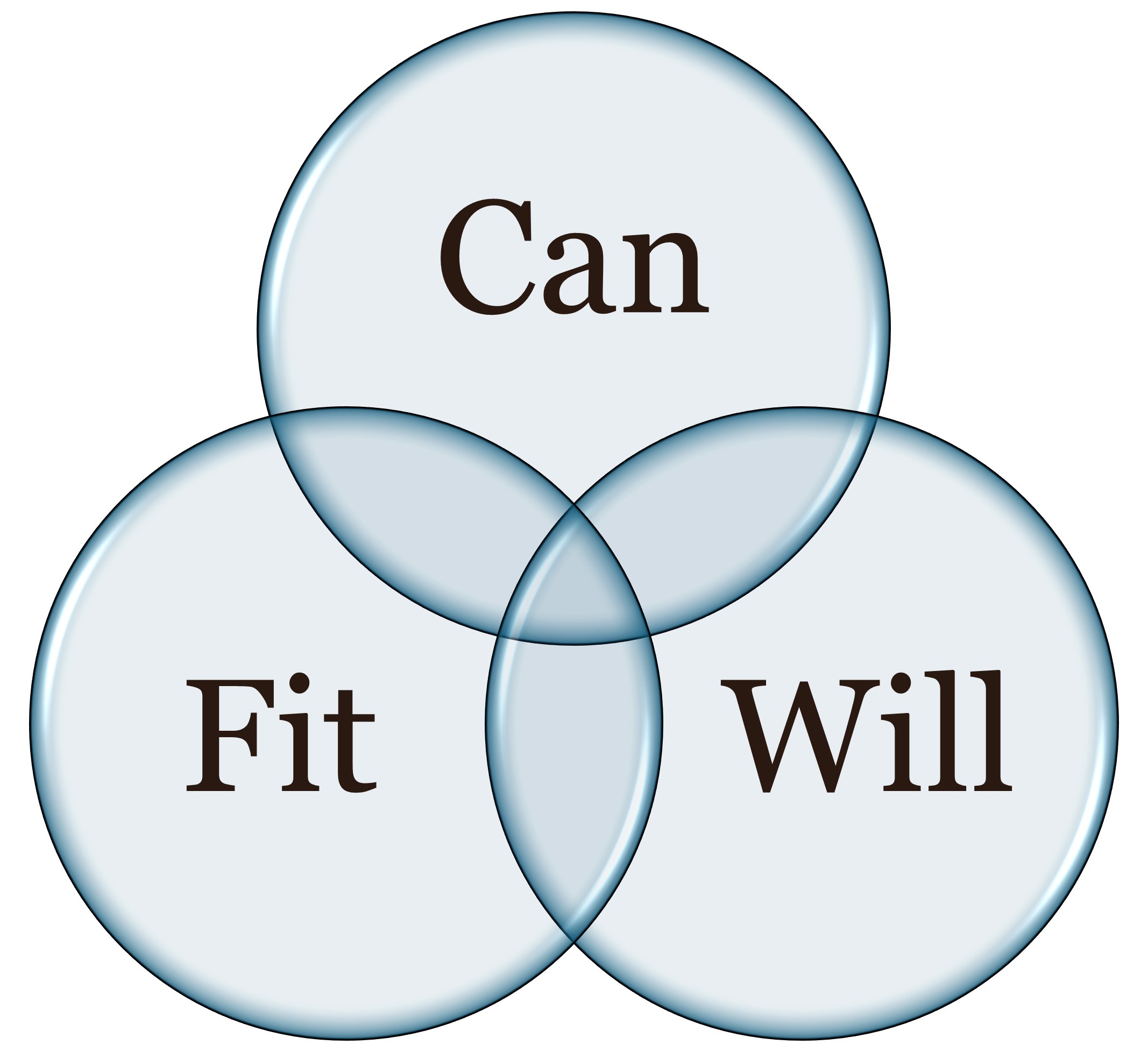
Maybe the role you’re interviewing for reports directly to someone in the executive leadership team.
Or maybe you’ve made it successfully through the interview with the team manager who you’d be reporting to should you get hired, and now they want you to meet with a VP or C-suite level leader – perhaps, it’s the person who would be your manager’s manager.
Either way, congratulations on getting this far into the selection process. And now, you might be wondering what interview questions you can expect from someone at this level.
 Generally speaking, the interviewing process is meant to reveal three main factors: Can, Will, and Fit. Can you do the job, will you do the job, and are you a fit with the team and the organization? Can and Will factors are typically readily assessed early on in the process, whereas Fit takes more time and conversation to assess and tends to be the main focus of the majority of the interviewing process.
Generally speaking, the interviewing process is meant to reveal three main factors: Can, Will, and Fit. Can you do the job, will you do the job, and are you a fit with the team and the organization? Can and Will factors are typically readily assessed early on in the process, whereas Fit takes more time and conversation to assess and tends to be the main focus of the majority of the interviewing process.
In most cases, mid-level managers and executives are coming at the Fit factor from slightly different perspectives. The manager of a team is usually most interested in knowing if you will fit into the team in which you’d be working. An executive with a larger organizational perspective and multiple teams to oversee and who is less hands-on at the team direction level is usually most interested in knowing if you will fit into the organization.
So, when you interview with C-level or VP-level leaders, it will usually be a conversation focused on your understanding of the company, the industry, and your profession. They will likely ask you about your goals and aspirations and maybe even how you envision your future and your career progression with the organization. They may be interested in your personal traits, work style, and values. Because of their perspective, they want to know how it all fits together into the strategy and growth as a division and/or organization.
To help you prepare, here are some of the interview questions they might ask you, as well as the potential rationale behind each question:
Tell me about yourself.
The most likely person to ask this is an executive. You may think it’s simply an icebreaker question, but actually this question is an invitation to “pitch” your strengths and why you’re a good fit for the role. So, you don’t want to recount your whole life story, and definitely stay away from personal information like how you’re recently divorced or that you have two kids and a dog. Instead, focus on the skills and achievements you’ve gained throughout your work history that specifically relate to the position for which you’re interviewing. Be sure to mention the relevant career highlights and/or training credentials that demonstrate your fit for and interest in the role. Variations of this question include:
- Tell me about your last job. They not only want to learn about what you did in your previous role, but they also want to ascertain your knowledge level and to assess how they can use what you know, as well as make sure this role is in alignment for this step in your career.
- Tell me about your career so far. This more direct version of the question steers your response so that you’ll speak specifically about your career instead of including extraneous details about your life. The specificity of the question is not only informational, but it also helps them to watch for patterns and themes in your work history.
- How did your last job (or how does your current role) fit into the overall business? In addition to being a variation of the above, this is most definitely a strategic mindset question. Your answer helps them to see whether you have strategic-level understanding, and, if so, how much.
Tell me about your ideal job.
When they ask this question, they’re looking for your key motivations, values, and what is most important to you. They use this to gauge how well you’ll fit into their culture. They want to find out if what is ideal and important to you matches up to what they offer. Your answer will reveal how self-aware you are, so it’s best to prepare ahead of time. Know what your ideal factors (tangibles and intangibles) are, and, of course, if possible, try to learn what you can about their culture/company so you’ll be even better prepared for this question.
What will you bring to the job or company if we hire you?
This direct question is asked to see if you understand what’s needed in the role and how to make it happen with your abilities and expertise. Like “tell me about yourself,” this is a specific invitation to “pitch” your strengths and why you’re a good fit for the role. So, you need to know your strengths, as well as how you perceive yourself fitting into their plans and culture based on the information you’ve gathered during your conversations so far and the internet research you’ve done to prepare for the interview process with them. Variations of this question include:
- Why should we hire you? This is simply a shorter version of the same question.
- Please tell me, in your own words, what you understand about the role and what’s expected. This variant takes a short detour away from the “what you bring and how you’re a match” part of the discussion and focuses specifically on your understanding of what’s needed in the role. It’s a great question to ask, and it signals good communication technique on the part of the executive. It’s smart to be sure that everyone is on the same page, especially you, and having this conversation now helps to avoid potential pitfalls that might arise later after you’re hired.
Tell me about the culture at your last/current employer.
There could be several reasons for asking this question: to see how you interpret and explain company culture; to see if where you’ve worked matches up at all to their company culture; and to see if you have the maturity to keep it positive when talking about your current or past employer (especially if your reason for leaving is related to company culture).
What personal goals do you have, and how are you going about achieving them?
In addition to learning about your goals, your answer to this question reveals information about your interest in learning and self-development. You should show that you’ve thought about this question before and that you are planning and setting goals for yourself. Be specific and mention a personal/professional development book you’re reading, an online course you’re taking, a certification you’re looking into, a group or association you’ve joined, etc. On the other hand, you should also show that you are flexible with your goals because it’s impossible to predict the future. You might conclude your answer with a comment about how you’re open to possibilities as they come along and that what’s important is that you have opportunities to learn, develop, and evolve. Here are some other variations of this question:
- Where do you want to be/where do you see your career in 2, 5, 10 years? This is probably the most popular variant of the goals question. How you would answer this depends on how specific you want to get. If you want to keep it big-picture and intangible, your answer might be something like: “I’ve truly enjoyed my role in this field and as of right now I intend to continue along this path. But wherever my career takes me over the years, I know I will want to make a more significant contribution to the organization. In the years to come, I plan to have developed new skills and abilities. To have become better qualified in whatever way suits the situation and opportunities I have. To be well-regarded by my peers and respected by my managers as someone who continues to contribute meaningfully to the bottom line and to the organization’s stakeholders.”
- Tell me about the last book you read. Or What book has influenced you the most? This is a rare question, but it does come up from time to time, so it’s best to be prepared for it. As you can see, while it’s indirectly related to your goals, it does inquire specifically into your self-development and the value you place on self-development. It’s also a way to find out more about your motivations and values. (Need some ideas? Check out Good Reads’ list of popular professional development books.)
Why do you want this job?
The rationale behind this question is obviously to determine alignment and fit and to hear it in your own words. State what you like about the company and its positive reputation in the marketplace (if applicable). State why and how the company/job matches up to your ideal.
© Angela Loeb
